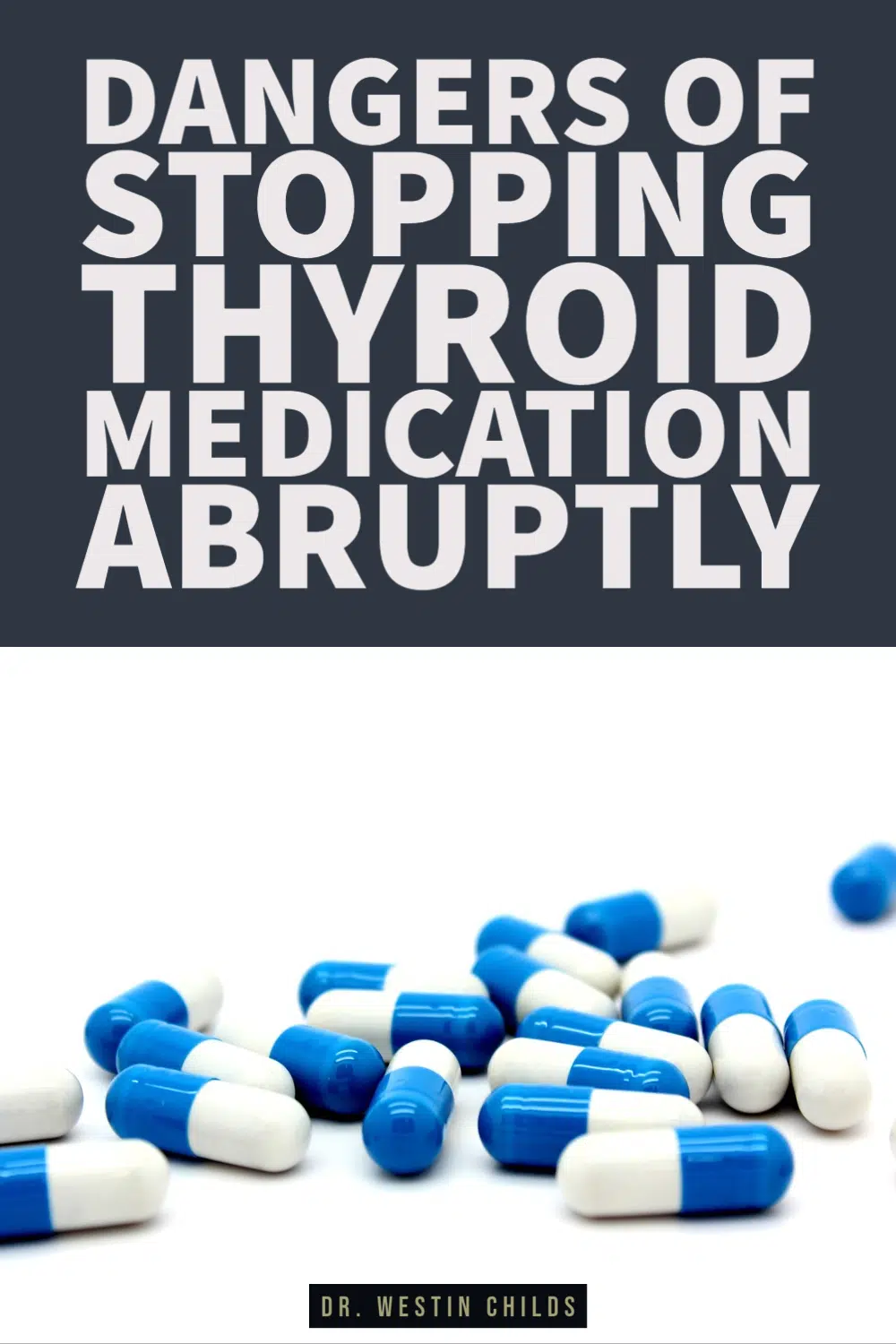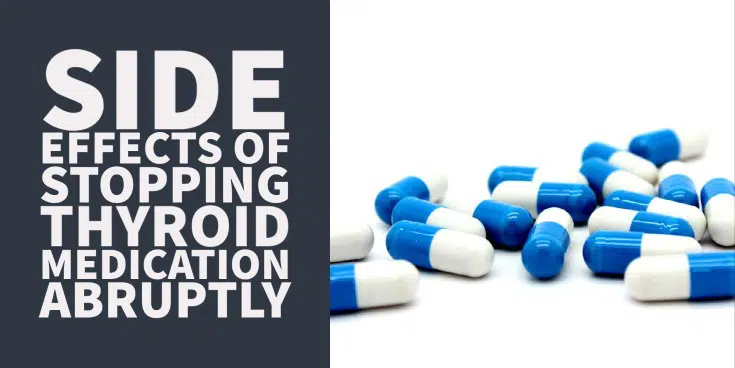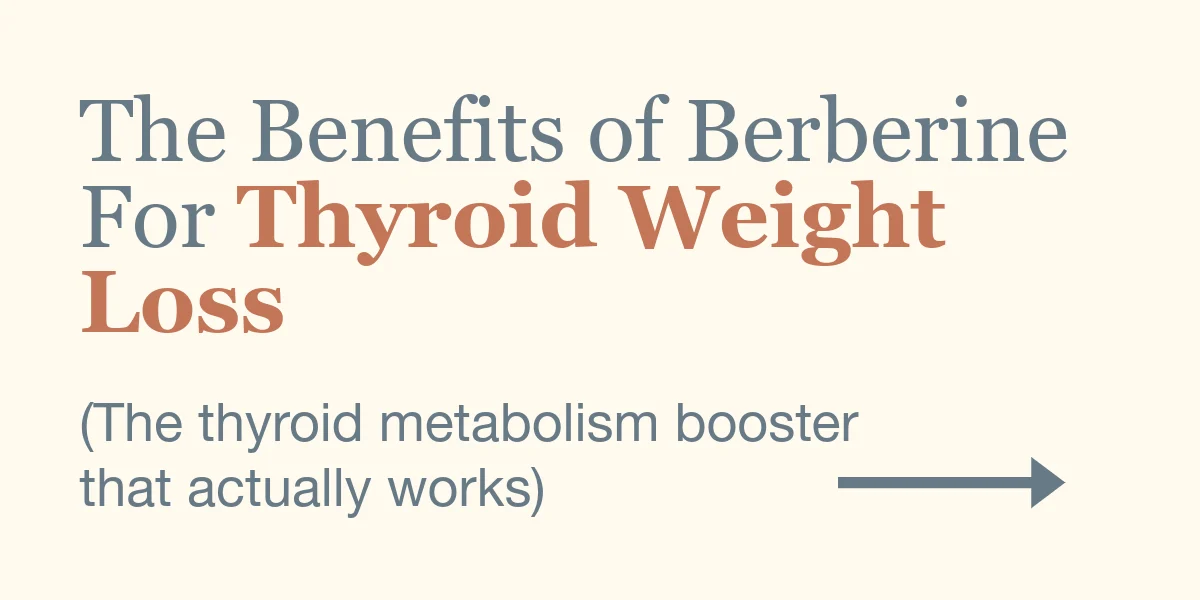Is it safe to stop taking thyroid medication?
In most cases, if you stop taking your medication cold turkey, you will experience many negative side effects.
In this post you will learn more about why you shouldn’t stop taking your thyroid medication (without physician supervision), the side effects of stopping thyroid medication abruptly, reasons why it isn’t safe and what to do instead.
Let’s jump in:
Is it Safe to Stop Taking Thyroid Medication?
The answer is no, in many cases it is not safe to stop taking your thyroid medication (at least not without physician supervision).
In some cases, it’s actually incredibly risky to stop taking your medication, especially if you have had your thyroid removed or destroyed from radioactive iodine ablation.
It may surprise you that your thyroid is responsible for some very important functions inside your body.
And when I say important, that’s really an understatement.
Thyroid hormone is required to function optimally, but it’s also required for you to be alive.
Fortunately, there are VERY few deaths from these conditions due to the ability to catch and diagnose thyroid dysfunction.
The problem does not occur with the diagnosis of thyroid function, instead, it occurs with the MANAGEMENT of thyroid disease via thyroid hormone (2).

Most doctors can easily and readily diagnose thyroid dysfunction, but the way that they treat thyroid dysfunction has led to many disgruntled thyroid patients.
These patients then go out and seek alternative therapies to try and feel better.
But make no mistake, the problem is not necessarily the medication (you probably need thyroid medication), instead, the problem has more to do with dosing, the type of thyroid medication you are taking, etc.
If you were put on thyroid medication then there is probably a good reason that you need it.
The problem with stopping your medication (abruptly or otherwise) has to do with how thyroid hormone impacts your body.
When you take exogenous thyroid medication (like levothyroxine or Synthroid) you are basically shutting down the ability of your own body to produce thyroid hormone naturally.
Your body then becomes reliant upon the medication that you are putting into your body each and every day.
If you suddenly stop taking that medication your body will not be able to produce its own thyroid hormone (usually for days to weeks) and during this time period, you will most likely feel terrible.
The symptoms that you will experience tend to mimic the symptoms of hypothyroidism (which probably lead you to your Doctor, to begin with) but may even be worse.
Symptoms associated with stopping thyroid medication include:
- Worsening of brain fog
- Increased fatigue
- Increased weight gain
- Increased menstrual irregularity
- Increased hair loss
- Worsening of constipation or GI issues
- Worsening memory function
- Increased pain
- And other symptoms of hypothyroidism
These side effects usually mimic the side effects of hypothyroidism, because if you stop taking your medication your body will not be able to produce it naturally for some time.
This may sound depressing, but it doesn’t have to be.
Instead of stopping your medication, there is another approach.
We will discuss more about that below (you can skip there if you want to now), but first I want to discuss some basics about how thyroid medication is impacting your body.
DOWNLOAD FREE RESOURCES
Foods to Avoid if you Have Thyroid Problems:
I’ve found that these 10 foods cause the most problems for thyroid patients. Learn which foods you should avoid if you have thyroid disease of any type.
The Complete List of Thyroid Lab tests:
The list includes optimal ranges, normal ranges, and the complete list of tests you need to diagnose and manage thyroid disease correctly!
4 Reasons You’ll Probably get Worse If you Stop Taking your Medication
There will always be exceptions to these reasons, but most of you will probably feel worse if you stop taking your thyroid medication for the following reasons:
#1. Your Body May be Reliant upon the Medication
The first group of patients that should never stop taking thyroid medication includes those who do not have a thyroid or those who have had their thyroid removed.
This typically stems from conditions such as hyperthyroidism or thyroid cancer.
If you don’t have a thyroid (or if it’s destroyed) then you are REQUIRED to supplement with thyroid hormone indefinitely (3)!
That means you will NEED to take thyroid medication for the rest of your life.
Remember, we said that thyroid hormone is required for you to function and for you to live.
If you can’t produce it naturally then you have to take it in some other way.
This group of people should never make changes to their thyroid medication without physician supervision as it can be very dangerous.
Does that mean that you need to suffer from any existing symptoms?
No, but it does mean that you should be very thoughtful about any changes you make to your thyroid medication and dosing.
In many cases, adding some T3 to your current medication regimen is enough to improve your symptoms dramatically.
I’ve discussed various options for patients post-thyroidectomy in this post here.
This information is also relevant if you have had your thyroid damaged or destroyed via RAI.
#2. Your HPT Axis is Blunted
When you take thyroid hormone it causes a feedback loop that inhibits the natural production of TSH from your pituitary gland.
The more thyroid hormone you take, the lower your TSH will go (4).
TSH stands for ‘thyroid stimulating hormone’ because it stimulates the production and release of thyroid hormone from your thyroid gland.
The lower your TSH goes the more your body is reliant upon thyroid medication for thyroid hormone.
TSH is part of an important axis known as the hypothalamic-pituitary-thyroid axis (5).
In this axis, your body produces TRH which stimulates TSH which stimulates thyroid hormone production.
This normal axis is disrupted when you take any sort of thyroid medication (T4 or T3 or otherwise).
Even some supplements, such as iodine, can alter this axis.
It’s important to realize that this axis is altered when you take thyroid function because it impacts your body’s ability to produce thyroid hormone if you stop or alter your medication.
This axis is very sensitive and it can take weeks to months for it to come back to normal.
Consider cases of HPA suppression from cortisol (which can take 6-12 months to recover) (6) or cases of HPO suppression from birth control medication.
While your body is trying to heal you will be left with an insufficient amount of thyroid hormone and you will most likely feel worse.
#3. Your Body may NOT be able to Produce Thyroid Hormone by itself at 100%
People may assume that when they stop taking thyroid medication their bodies will be able to start producing it on their own.
This should happen eventually, but you also have to consider the fact that your body may not be able to even produce a normal amount by itself (thus the requirement for additional thyroid hormone through medication).
Imagine this scenario:
If you have Hashimoto’s, and you’ve had it for many years, there is a good chance that you have some element of permanent thyroid damage to your gland.
The autoimmune component of Hashimoto’s may lead to the eventual destruction of your entire thyroid gland which means it can no longer produce thyroid hormone by itself.
Even though this process can take years or decades before you lose 100% of function you will lose 50% of function and so on.
So, if you decide to stop taking your medication your body can only produce the amount that it is capable of producing.
If your body is capable of producing less than the amount that you are taking then you will be at an even worse deficit!
In some cases, you may be able to improve the amount that your body produces naturally, but you won’t be able to determine how much this is unless you go off your medication.
This may be an option for some people, but again, it should not be done without physician supervision.
The last thing you want to have happened when you alter your medication is that you feel worse.
#4. Thyroid Supplements do not Replace Thyroid Hormone (They aren’t as powerful as medications)
Lastly, some people make the assumption that taking thyroid supplements (such as those available over the counter) may allow them to stop taking their thyroid medication.
I am a big fan of thyroid supplementation and recommend that many of my patients use very specific and powerful supplements.
But it’s not safe to assume that supplements have the ability to replace thyroid medication.

Thyroid medication is always more potent and more powerful than any supplement (available over the counter).
Thyroid hormones are regulated by the FDA which means that they require a prescription medication.
The only exception is T2, which is available in some over-the-counter supplements.
T3 and T4 will require a physician’s supervision.
It is possible to purchase T3 and T4 via online pharmacies, but these pharmacies may not supply you with the correct dose or medication and they are not worth the risk (in my opinion).
Why do Some People Feel Better when they Stop Taking their Medication?
If you spend any time researching on the internet you will always find someone who has a positive experience when they stop taking their medication.
But you have to ask yourself a very important question:
Are their experiences, medical conditions, circumstances, etc. the exact same as mine?
In most cases, you will find the answer to that question is no.
It’s very possible that these patients may have been incorrectly placed on thyroid hormones, to begin with.
If you are taking thyroid medication, especially T4, and your body didn’t actually need it, then stopping the medication may actually make you feel better.
This likely has to do with thyroid hormone conversion and metabolism in your body.
But, let’s go back to the idea of incorrectly taking thyroid medication for a minute.
It’s possible, that through incorrect testing of an isolated TSH test, patients can be placed on thyroid medication inappropriately.
Your TSH can fluctuate on a daily, weekly, and monthly basis and is sensitive to factors such as stress, supplements, sleep, and so on.
In addition, it’s estimated that up to 5% of lab tests are inaccurate (just from the standard error of measurement).
Either of these conditions can set the stage for improper management in a patient with normal thyroid function.
The chances of this happening are slim, but the chances of stopping thyroid medication and feeling better are also slim.
Just realize that some people may feel better when they stop the medication, but the exact reason should be evaluated on the individual level.
Never make any assumptions about your body or your thyroid function based on someone else’s experience.
What to do Instead of Stopping your Thyroid Medication
If you feel like you are stuck with your current thyroid medication and aren’t sure what to do then this is the section for you.
Before you consider stopping your thyroid medication make sure you at least look at these potential options which tend to help MOST people.
#1. Get a Complete Thyroid Lab Panel
The first step is to get a complete thyroid lab panel.
I’ve discussed, at length, what is included in this panel, and you can find more information in this post.
The reason that this is so important is that, without it, you are really flying blind.
Ordering and obtaining all of the thyroid lab tests will help give you information about how well you are absorbing thyroid medication, how well you are utilizing it in your body, how your body is metabolizing/converting it, and so on.
This step is the MOST important (well, second to only #5) for ensuring that you feel better because you can’t treat without it.
If your current doctor is unwilling to order these tests then you may need to seek out a second opinion and look for someone who specializes in thyroid care.
This lab panel includes the following tests: TSH, free t3, free t4, reverse T3, thyroid antibodies, and sex hormone-binding globulin.
You can read more about what each test tells you, including optimal ranges, in this post.
#2. Consider Altering your Medication or Dose
The next step, which hopefully follows #1, is to take a hard look at which medication you are currently using.
Most patients, especially those who feel terrible, all find themselves taking the same medication: levothyroxine or Synthroid.
This T4-only thyroid medication may be one of the reasons that you aren’t feeling well.
In order for your body to activate this medication, it must convert it into T3 (through thyroid conversion) and not everyone does this at the same rate.
This means that there are some people (up to 15% of the population based on genetic studies) who simply don’t do well on T4-only thyroid medication.
In a great many cases, feeling better can be as easy as switching up the type of medication you are taking.
Medications like NDT (Armour thyroid and WP thyroid) or Cytomel/liothyronine, contain T3 and can be added to your current thyroid regimen.
In other cases, it may not be that you are on the wrong medication, but that you are taking an insufficient dose.
The answer to people in this category may be as easy as increasing your medication.
#3. Consider adding Thyroid Supplements to Compliment your Medication
Another surprisingly effective strategy for improving your thyroid is through the use of targeted supplements.
Some patients may be able to dramatically improve their symptoms (reduce their symptoms) with the use of these high-quality supplements.
I have several supplements that I have used on hundreds of patients which you can find more about here.
When you use supplements make sure that you find very high-quality supplements, and make sure that you are using it for your desired outcome.
Not all supplements are created equal and not all thyroid patients will need the exact same supplements.
If you know that you have low T3 or have a problem converting thyroid hormone, then taking a supplement designed for improving T3 conversion is probably ideal.
If you know that you have low energy from adrenal issues, then taking an adrenal/thyroid supplement is probably ideal.
If you know that you have gut issues that may be contributing to your Hashimoto’s, then taking a probiotic may be ideal.
These supplements can be used in conjunction with your existing thyroid medication and with other therapies, which makes them great for “layering” therapies on top of each other.
You’ll often find, and this is the case in my practice, that those people who do more than one thing at a time often have more improvement than those who do one thing.
Supplements also have the advantage of being available over the counter, which means that they are easy to get (much easier than thyroid medication).
Whenever possible, it’s always a great idea to take your health into your own hands, do your own research, and make informed decisions about your body and health.
Supplements allow you to do just that.
#4. Improve your lifestyle (Diet + Exercise + Stress Reduction)
In case you aren’t already aware, another very important factor that is within your control is the food that you put into your body and how much you exercise.
If you aren’t doing these two things then you are potentially missing out on an improvement in your symptoms.
Diet and exercise by themselves are probably not enough to “cure” your condition (though they may for some) but they will allow you to feel better, help maintains your weight, and improves thyroid function.
Included with diet and exercise should be stress reduction techniques.
Techniques such as meditation are also incredibly powerful at reducing stress and helping you cope with difficult situations.
Stress may not always be within your control, but what you can control is how well you cope with it by adding certain techniques.
I’ve written extensively about diet, exercise, and thyroid function on this blog before so I won’t go deep into it now.
Just realize this is something you should be doing.
#5. Find a New Doctor (or get a second opinion)
Lastly, and perhaps the most important thing you can do is to try and find a physician or Doctor who is willing and able to help you with your condition.
Doctors such as endocrinologists and PCPs may, surprisingly, not be best suited to help you.
These physicians tend to be engrained in their logic and thought patterns and are not really interested in newer or alternative therapies (even though these therapies are well-studied and proven to be effective).
In most cases, it’s not worth the energy to fight with your Doctor for tests or medications.
The chances you of convincing your doctor to do this are slim to none.
A better approach, however, is to find a Doctor who is already knowledgeable and understands how to help.
This can definitely but difficult, but I’ve put together some resources to help.
You can find more information about how to find a thyroid doctor here.
Final Thoughts
The bottom line?
In most cases, discontinuing your thyroid medication (abruptly or otherwise) is not a wise decision.
The exception would be if you are starting a new medication, altering your dose or if you are doing it with physician supervision.
It’s far better, instead, to try other therapies (which are proven to be effective) with a knowledgeable physician.
Now I want to hear from you:
Are you struggling with getting proper thyroid care?
Is your current physician unwilling to work with you to try something new?
Have you thought about discontinuing your medication?
Leave your comments below!








